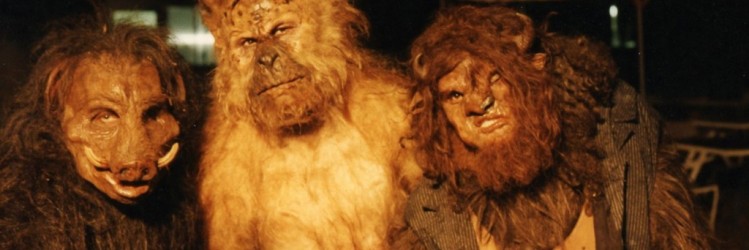Cinema | August 26th, 2015

Lovers of bad cinema will marvel at Blue Underground co-founder and veteran “making of” and bonus feature producer David Gregory’s anatomy of a train wreck “Lost Soul: The Doomed Journey of Richard Stanley’s Island of Dr. Moreau.” Sharing war stories of the 1996 Marlon Brando/Val Kilmer debacle ultimately directed by John Frankenheimer, Gregory’s documentary is akin to more effective brethren like “Jodorowsky’s Dune,” “Lost in La Mancha” and “Hearts of Darkness: A Filmmaker’s Apocalypse,” the latter of which bears a unique connection to “The Island of Dr. Moreau” via a peculiar rivalry between authors H. G. Wells and Joseph Conrad, and filmmaker Richard Stanley’s familial connection to explorer Sir Henry Morton Stanley, one purported inspiration for the character Kurtz.
The younger Stanley, who made his cinematic mark as the auteur behind 1990 cyberpunk cult item “Hardware,” takes center stage in “Lost Soul,” and the first half of the movie focuses on Stanley’s devotion to the source material that would painfully, frustratingly elude his grasp and control. A raconteur whose ability to speak effusively about his expansive cinematic visions recalls Alejandro Jodorowsky presenting his insanely detailed “Dune” pre-production book, Stanley also reveals enough about his own superstitions and belief in mysticism to explain at least in part how he might have been terminated by nervous, frustrated New Line executives.
Once Stanley is fired, Gregory shifts his focus to Brando’s erratic on-set behavior. The legendary actor, who had recently lost his daughter Cheyenne to suicide, reinforced most of his late-career stereotypes and invented a few more for good measure. Arriving long after he was due and showing nothing but contempt for the business practices of the movie industry, Brando — according to Fairuza Balk and others — deliberately sabotaged the production. Entirely unmanageable, Brando insisted on performing in whiteface, using an in-ear monitor to avoid the bother of learning his lines, and expanding the role of the 28-inch tall Nelson de la Rosa. Devotees of “The Island of Dr. Moreau” as a jewel of awful movie-making will be relieved to know that Gregory includes some discussion of what is perhaps Brando’s finest bit of disobedience/tomfoolery to make the final cut: Dr. Moreau’s ice bucket hat.
Gregory also alludes to the ongoing discord between Brando and Kilmer, but “Lost Soul” unfortunately doesn’t recount the specific throwdown between the two in which Brando is supposed to have said to Kilmer, “You’re confusing your talents with the size of your paycheck.” While Brando’s antics are recalled with a sense of bemusement, nobody in Gregory’s film has a single nice thing to say about egomaniac Kilmer, who by every account behaved like an absolute ass from start to finish.
Unfortunately, but not surprisingly, Kilmer does not speak on his own behalf, and neither does David Thewlis, who replaced an understandably skittish Rob Morrow when the movie started to fall apart. The most prominent actors on record are Balk, whose frank observations are among the movie’s highlights, and Marco Hofschneider, who describes several additional Brando shenanigans. Like the “Dune” that Jodorowsky never got to make, Stanley’s unrealized version of “The Island of Dr. Moreau” is surely more magnificent as a mirage, a myth and a legend. Even though he did not get to fashion his dream into reality, Stanley pulled off one stunt that caps the stranger-than-fiction saga: the legally banished director managed to sneak back to the set, appearing incognito behind latex in the finished movie as one of the dog-like mutant experiments of Dr. Moreau.
“Lost Soul” is currently available on Netflix instant watch and other digital platforms.
July 15th 2025
July 15th 2025
July 7th 2025
July 1st 2025
June 24th 2025
__293px-wide.jpg)
_(1)__293px-wide.jpg)
__293px-wide.jpg)


